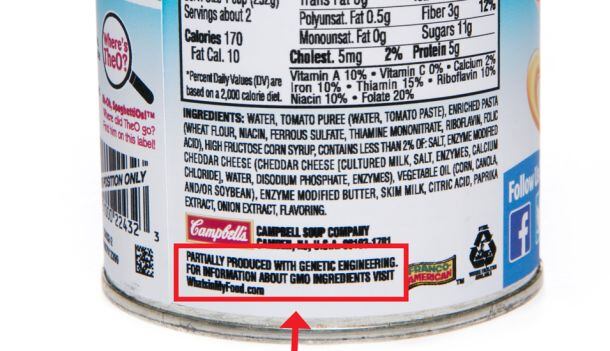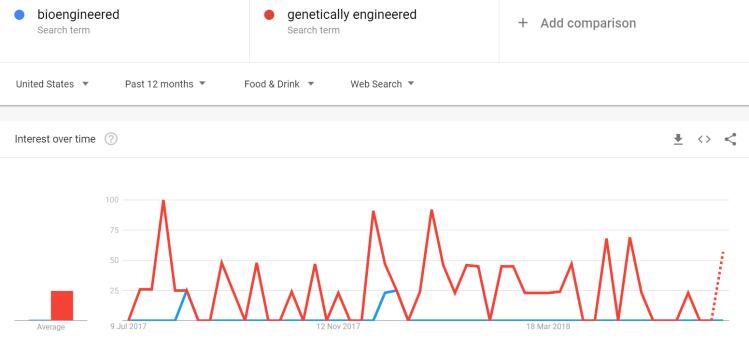One notable omission from the proposed rule (which USDA hopes to finalize later this year) is a definition of ‘non-bioengineered,’ which could become a contentious issue if companies believe they have the green light to make non-BE claims on anything not included in the ‘bioengineered’ definition.
While the original GMO labeling statute stressed that foods not complying with the bioengineered definition are not to be considered automatically ‘non-bioengineered,’ or ‘Non-GMO,’ “this language is not clearly or explicitly stated in the proposed rule,” noted Whole Foods Market in its comments to the USDA.
“Consumers do not consider animal ingredients from animals fed bioengineered feed to be ‘non-GMO,’ and the regulation must clearly and explicitly prohibit such representations.”
The Organic Trade Association also raised questions about what the proposed rule doesn’t cover: “What about non-BE claims? The proposed rule is silent on any requirements or guidelines related to the use of absence claims.
“The final rule should clearly state that products exempt from mandatory disclosure as bioengineered foods, such as milk from cows fed genetically modified feed, may not by default automatically qualify for a ‘negative’ or ‘absence’ claim solely because the food is not required to bear a disclosure.”
'A fractured and confusing environment for consumers'
If USDA excludes refined ingredients such as soybean oil or high fructose corn syrup (HFCS) from its final ‘bioengineered’ definition, meanwhile, it also raises the possibility that some brands could make non-BE claims on a product containing HFCS, while others could proactively make BE claims about exactly the same product by voluntarily informing shoppers that the HFCS is from genetically engineered corn.
If the bioengineered definition ends up being very narrow, many companies will want to make voluntary disclosures to be transparent, which could lead to a proliferation of confusing and inconsistent claims, Hershey predicted: “Widespread voluntary disclosure will create a fractured and confusing environment for consumers.”

Many big food brands were originally opposed to GMO labeling on the grounds that it would unfairly demonize biotech crops by falsely implying they present greater risks to human health and the environment than conventional crops.
However, several high-profile names from Campbell Soup to Mars Wrigley have since embraced federal GMO labeling legislation because it demonstrates a commitment to transparency and because a national law is better than a patchwork of state laws.
PCC Natural Markets: Exempting highly processed ingredients will be viewed as ‘intentional deception’
In general, farmers favor a narrow definition of ‘bioengineered,’ while leading CPG companies fear this could backfire by making it look like food brands are deliberately concealing information from consumers.
Consumers, they argue, will have no faith in GMO labels if they don’t cover foods containing soybean oil, sugar, high fructose corn syrup and other refined ingredients derived from crops everyone knows are genetically engineered.
And if consumers don’t trust the new labels, the whole exercise will have been a huge waste of everyone’s time and money, claimed the American Beverage Association, which was previously against GMO labeling but has since come round the idea that if it has to be implemented, it has to be done in a way that fosters trust.
“If, ultimately, implementation… results in disclosure for only a minimal subset of foods… or exempts from disclosure a majority of foods consumers would consider to be bioengineered, consumers will undoubtedly be confused.
“Rather than helping to build trust in bioengineered foods, such a rule will, instead, foster unease among consumers, who will lose confidence in this regulatory effort.”
Retailer PCC Community Markets added: “Exempting highly processed and refined products from the scope of the NBFDS is very likely to be viewed by consumers as intentional deception.”
Making labeling contingent upon the presence of detectable rDNA also misses the whole point of the exercise for many consumers, who “object to GMO crops not out of fear of consuming recombinant DNA or altered proteins, but due to concerns about the impacts of GMO crops on the environment, traditional farmers, animals, and genetic diversity,” argued the American Herbal Products Association.
A double standard?
However, US sugar beet farmers said CPG companies and retailers were deploying double standards.
On the one hand, they said, many food companies argue refined sugars/oils from GM crops should be labeled, even if they contain no detectable rDNA, in the interests of transparency. At the same time, noted the sugar beet companies, the same companies also argue that ingredients and enzymes from GM microorganisms should not be labeled.
“We are concerned that there is a willingness to exclude certain foods and ingredients that contain some level of genetic material, albeit small, but an unwillingness to exclude refined sugar from the definition of a bioengineered food when scientific evidence unequivocally demonstrates that refined sugar contains no genetic material at all.”

"The public expects that if genetic engineering has been used in the development of a crop or other food input, then the resulting product is a GMO. To exclude something simply because of the limitations of current testing methodology is not only misleading, but also renders the NBFDS [National Bioengineered Food Disclosure Standard] largely meaningless, as it would effectively exempt the majority of GMO foods from disclosure."
Megan Westgate, The Non GMO Project

NPA: GMO is a loaded term; bioengineered is more neutral
As for the terms ‘bioengineered’ and ‘BE,’ reactions have been mixed, with many anti-GMO activists and food industry stakeholders alike arguing that consumers don’t recognize them, and that ‘genetically engineered’ or ‘GMO’ are more familiar.
That said, ‘GMO’ is such a loaded term for many consumers that ‘bioengineered’ might be a better choice if USDA wants a term that neither promotes nor disparages the technology, argued the Natural Products Association.
Indeed, the issue has now become so polarized that any disclosure could end up serving as a warning label, claimed the National Milk Producers Federation, which urged USDA to include a disclaimer alongside BE labels such as: “No material difference has been shown between ingredients created using bioengineering and ingredients created without bioengineering.”
Here is a selection of comments on the proposed GMO labeling rule:
The Council for Responsible Nutrition: We recommend the adoption of a single BE food list consisting of 10 commercially available BE plants; the exclusion of incidental additives, processing aids, and products with undetectable modified DNA from the standard; the exemption of foods derived from microorganisms that consume BE feed; and the adoption of a threshold that would exempt products with less than 5% by weight of BE material (per ingredient) that is unintentional or technically unavoidable.
Campbell Soup: According to our research, consumers want to know the BE status of the crop from which the ingredient is made (or is the ingredient itself), not whether refining or processing the crop removes genetic material prior to its use in food as an ingredient.
FMI: For products that do not meet the definition of ‘bioengineered food,’ but that contain an ingredient derived from the BE Source List, manufacturers and retailers should be permitted to make voluntary disclosures using phraseology that is distinctly different from the mandatory disclosure language.
John Foraker, CEO, Once Upon a Farm: All GMO foods including foods with GMO ingredients like refined sugars and oils, and foods with ingredients derived from all forms of genetic engineering like CRISPR and RNAi must carry GMO disclosures…
The USDA should use the words consumers already know. Millions of consumers are actively avoiding GMOs with commonly understood terminology that has been developed and widely used by consumers and industry in the US for more than two decades. Why throw that out and start over?
Mars: The proposed rule… places an extreme regulatory burden on Mars and similarly situated manufacturers who changed their labels in reliance on FDA’s acceptance of the term ‘genetic engineering’ and to comply with Vermont’s GE labeling law.
Whole Foods Market - Consumers who choose to avoid bioengineered foods are looking to avoid ingredients derived from bioengineered crops, regardless of whether testable genetic material (proteins or DNA) is present in the finished product… We also believe that claims using the acronym “GMO,” “GMOs,” or “GE” are well understood by consumers.
The Non GMO Project: Companies that have led the way with disclosure have generally used ‘genetically engineered’ or ‘GMO,’ pursuant to the various state labeling bills as well as the guidelines in the Whole Foods Market GMO Labeling Policy. Making it illegal for those companies to continue disclosure using terms the public understands, and instead requiring them to change their labels in favor of terms that have no meaning to the American public, would be a blatant (and expensive) exercise in obfuscation.
The American Farm Bureau Federation, American Soybean Association, American Sugarbeet Growers Association, National Corn Growers Association, National Cotton Council and US Canola Association: Refined products should not be included in the definition of a BE food.
The International Dairy Foods Association: AMS should exclude ingredients that are produced through fermentation, including when the fermentation organism and/or the feedstock or media are, or are derived from, products of bioengineering, such as enzymes, amino acids, citric acid, vinegar, and vitamins.
AMS should exclude ingredients that are produced through the chemical transformation of a bioengineered food or ingredient and substantially transformed into a new ingredient, such as caramel flavoring and color, polydextrose, vitamin C, and sugar alcohols.
The Organic & Natural Health Association: The use of any of the proposed BE logos or derivatives will prove ineffective given the fact that ‘bioengineered’ has no meaning in the marketplace.
The Academy of Nutrition and Dietetics: The Academy does not support a double standard exempting egg, meat, and poultry products from BE labeling, and reiterates that regulations designating various foods as bioengineered or not should be recognized by stakeholders as both internally consistent and grounded in science, such that there are clear legal and scientific reasons for exemptions beyond arbitrary policy and political reasons.
It it would not be a positive development for new technologies [eg. CRISPR] to operate outside of a regulatory framework as existing rules atrophy from a lack of regulatory flexibility.
American Soybean Association: [The proposed rule] creates a presumption that foods ‘derived from’ certain crops are bioengineered foods contrary to Congress’s intent that a be food ‘contain’ modified genetic material.
American Beverage Association: Certain food and beverage ingredients – such as carbon dioxide, citric acid, and ethanol – are generated as the output from manufacturing processes that may involve bioengineered starting materials… These ingredients should not be considered bioengineered.
AHPA: Particular attention should be given to replacing and revising the definition of ]bioengineered food,’ with definitions for ‘genetically modified organism,’ and ‘genetically modified food.’
The Organic Consumers Association: Please require that highly processed and refined GMO ingredients.
Kansas Corn Growers Association: We are concerned that some of the options being considered have the potential to harm US agriculture and stifle American farming innovation by presuming or implying that refined ingredients like sugars and oils, derived from a bioengineered crop, contain genetic material when sound science shows they do not.
- To read what the GMA thinks, click HERE.
- To read what Hershey and Unilever think, click HERE.
- To see all the comments submitted on USDA’s proposed rule (the comment period ended on July 3), click HERE.
USDA was originally charged with publishing its final rule on GMO labeling by July 29, 2018, a deadline it will be unable to meet. It has not given a specific date for publication, but agriculture secretary Sonny Perdue recently said he hoped a final rule would be published “later this year.”
- To read the proposed rule, click HERE.
- The Non-GMO Project may emerge as the big winner from federal GMO labeling legislation
